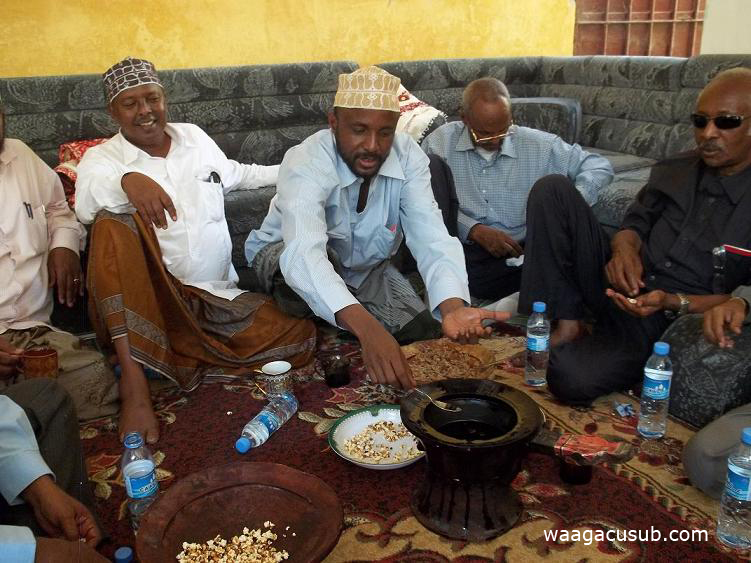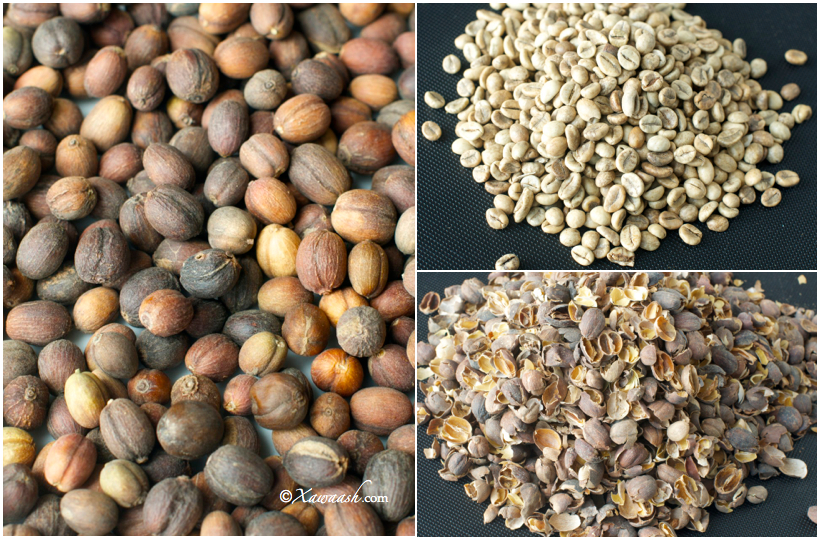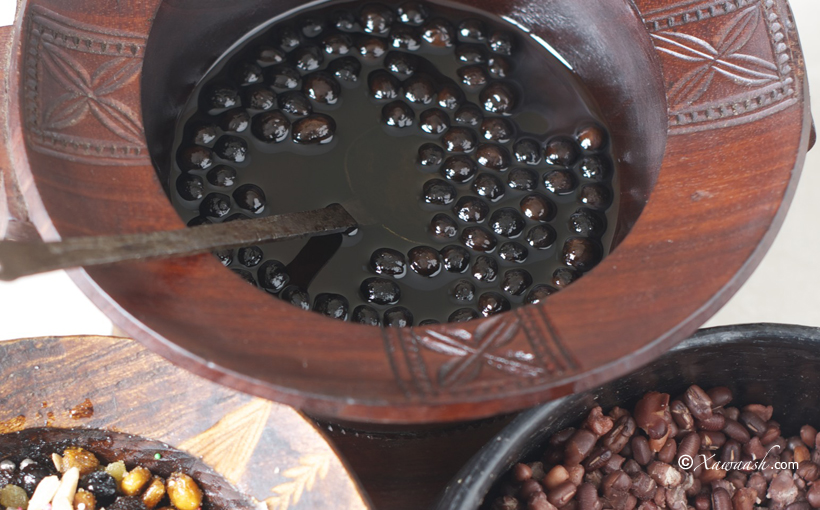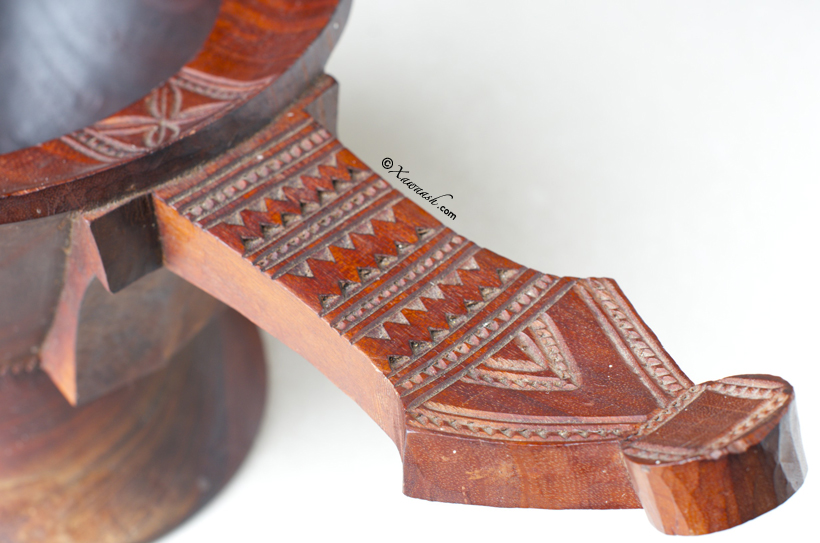Bun or bun sharuur is whole coffee beans with hull that are deep fried in ghee or oil. For Somalis, it is a delicacy that many associate with rituals. It is deeply tied to religious ceremonies whether small or large. Whenever there are prayer gatherings and feasts, the bun is a must. So much so that it became almost a necessity to offer it.
Wadaads (religious men) who come to the ceremonies to recite the Qur’an as well as other supplications, are the ones who are first offered the bun. The kur, the vessel in which the bun is served, is taken around the room so that everyone can inhale the aroma of the freshly prepared bun. Bun is usually eaten just a few at a time by placing two or three of the still hot, fried beans as well as a little of the ghee or oil in the palm of the hand. The beans are eaten off the palm and any remaining ghee is applied to the forehead.
Supplications are recited as the coffee beans are prepared for frying. There are supplications that are also recited when the fried beans are presented to the gathering. The final supplications are offered after consuming the bun. These supplications depend on the occasion. For example, families will sometimes host a prayer gathering to pray for a cure for a sick family member and the supplications are offered for that. Many families also hold small, weekly dhikr gatherings, usually on Fridays, and the supplications will be for warding off evil and getting blessings in one’s life. Some families host dhikr gatherings twice weekly, on Wednesdays and Fridays. It was believed that the angels like the smell of bun and they would visit the house where it is fried.
For the Sufi orders of Somalia, the heritage of the bun is an important part of the dhikr sessions. The recital and supplications can take several hours and chewing the bun helps the wadaads stay alert and it gives them energy. Somalis had a lot of regard and respect for wadaads and the bun that was prepared for them was fried with the best ghee available. When a prominent sheikh was offered bun fried in oil, he said as if addressing the bun:
Aw bunoow warkaa la helyee, burcadaa ku roon tahay!
Oh! bun. Your secret has been unearthed: your are best with ghee!
The hosts understood what he meant and they scrambled to fry another batch in ghee.
In some parts of Somalia, the bun is prepared for honouring guests and is presented after the meal. The special honour that was reserved for wadaads is extended to the guests.

A Somali elder showcasing his bun-eating talents and preserving age-old traditions. (Photo courtesy waagacusub.com)
Eating bun is also a morning ritual for some Somalis. It forms an important part of the breakfast. After eating bun, the ghee or oil is applied to the face making it ready to meet the world. This is known as foolbaxsi and it beats applying the best beauty lotions out there. The face will shine like a mirror and it will reflect the sunlight like varnish.
This reminds me of Daada, my paternal grandmother, who lived in Brava, Somalia. Her name was Hagia Ruqiya Madgabo Rufai and whenever I visited her in the mornings, she would rub sesame oil on my face. I disliked it but out of respect for her I never objected. As soon as she was out of sight, I would wipe off the oil. I should have known better.
Bun also forms part of the toor, which is a topping for ambulo and is also a snack on its own. The basic toor consists of bun, corn nuts or popcorn, sugar, and some of the ghee or oil in which the coffee beans for the bun were fried. Fancier versions of the toor have raisins and small bits of candy added. The bitterness of the fried coffee beans is offset by the sweet additions.
When preparing bun the traditional way, the hull is broken a little by biting it with the teeth. This helps get the hot oil inside the hull. However, when boiling the beans, water will also get inside and this can cause a lot of sputtering during frying. We did not break the hull but decided instead to use medium heat to give the beans ample time to cook fully and become very crumbly.
Ingredients:
(Tbsp is a tablespoon; tsp is a teaspoon)
(1 cup = 237 mL = 2.4 dl; 1 Tbsp = 15 mL; 1 tsp = 5 mL); all are level measurements
Bun:
- ¼ cup (25 g) Coffee beans – with hull
- 2 cups (474 mL) Water
- 1 cup (237 mL) Canola oil
- 2 Tbsp (30 mL) Browned butter or Ghee – Optional
Toor:
- 1 cup (150 g) Corn nuts
- 1 cup (160 g) Raisins – Dark & yellow (½ cup each)
- ¼ cup (35 g) Almonds (toasted)
- 4 Tbsp (60 mL) Candy
- 2 Tbsp (30 mL) Sugar
- ¼ cup (59 mL) Oil – Best with oil from the Bun
Corn Nuts:
- 1 cup (200 g) White corn kernels
- 3 cups (711 mL) Water – For soaking
- 3 cups (711 mL) Water – For cooking
- 1½ cups (355 mL) Canola oil
Directions:
- Wash the beans. Bring water to a boil then boil the beans for 1 minute.
- Drain the water and dry the beans.
- Fry the beans in hot oil using medium heat for 35 to 40 minutes. If you wish add browned butter or ghee just before turning off the heat.
Directions:
- Soak the corn overnight.
- Or use the quick soak method: Boil the corn for 5 minutes then cover and let it soak for one hour.
- Drain and rinse with cold water.
- Place the corn in a pot and add the water.
- Bring to a boil, then boil for 45 minutes.
- Drain the corn.
- Let the corn dry on a paper towel or a woven mat.
- Fry the corn in hot oil on medium heat for 45 minutes.
- Drain from the oil.
- Mix the toor by adding raisins, almonds, candy and sugar.
- After the oil has cooled down, add 1/4 cup of the bun oil or any oil of your choice. Mix well.
- Decorate with candy on the top.

Akhyaar Soomaali ah oo muujinaaya xirfadda bunaysiga. Waa dhaqankeenna oo aan ku faani karno. (Sawirkaan waxaan ka soo qaadannay goobta waagacusub.com)
Maqaaddiirta:
(QW waa qaaddo weyn – midda cuntada lagu cuno; qy waa qaaddo yar)
(1 koob = 237 mL = 2.4 dl; 1 QW = 15 mL; 1 qy = 5 mL)
Bun:
- ¼ koob (25 g) Bun
- 2 koob (474 mL) Biyo
- 1 koob (237 mL) Saliid caddeey
- 2 QW (30 mL) Subag
Toor:
- 1 koob (150 g) Daango
- 1 koob (160 g) Sabiib
- ¼ koob (35 g) Aalmond (la dubay)
- 4 QW (60 mL) Nanac
- 2 QW (30 mL) Sokor
- ¼ koob (59 mL) Saliid
Daango:
- 1 koob (200 g) Galleey cad
- 3 koob (711 mL) Biyo
- 3 koob (711 mL) Biyo
- 1½ koob (355 mL) Saliid caddeey
Diyaarinta:
- Bunka dhaq. Biyaha markay soo karaan, bunka ku rid. Muddo 1 daqiiqo ah karkari.
- Biyaha ka miir, kaddibna qalaji.
- Bunka waxaa ku dubtaa saliid kulul muddo 35 ilaa 40 daqiiqo, waxaana isticmaashaa dab dhexdhexaad ah. Haddaad rabtid, waxaa ku dari kartaa buuro la gaduudiyay ama subag intaadan dabka ka dejin.
Diyaarinta:
- Galleeyda hal habeen biyo la dhig.
- Ama isticmaal qasidda dhaqsada ah. Galleeyda biyo ku kari muddo 5 daqiiqo. Dabool ha qasnaato muddo 1 saac.
- Biyaha ka miir, kaddibna biyo raaci.
- Galleeyda digsi ku rid, biyahana ku shub
- Markay soo karto, kari muddo 45 daqiiqo.
- Biyaha ka miir.
- Xaanshida jikada ama xaarin ku war si ay si fiican u qallasho.
- Ku shiil saliid kulul muddo 45 daqiiqo. Waxaad isticmaashaa dab dhexdhexaad ah.
- Saliidda ka miir.
- Daangada toor: ku dar sabiibka, looska, nannaca iyo sokorta.
- 1/4 koob sharuur ku dar (markay saliidda qaboowdo) ama saliidda aad jeceshahay. Si fiican u qas.
- Nannac korka uga qurxi.
Bun ou bun sharuur se compose de grains de café dans leurs coques frits dans du ghee ou de l’huile. Beaucoup associent ce délice à des rituels. Il est profondément lié aux cérémonies religieuses, petites ou grandes. Là où il y a une fête ou un rassemblement pour une prière, il y a du bun. A tel point qu’il est devenu pratiquement obligatoire de l’offrir.
Les Wadaads (religieux) qui participent aux cérémonies pour réciter le Coran et autres prières, se voient offrir le bun les premiers. Le kur, le récipient pour servir le bun, fait le tour de la pièce pour que chacun puisse sentir l’arôme du bun fraîchement préparé. Le bun se mange par petites poignées: on place deux ou trois grains encore chauds et un peu d’huile ou de ghee, dans la paume de sa main. Les grains sont mangés dans la main et le ghee restant est appliqué sur le front.
Des prières sont récitées pendant que les grains de café sont préparés pour la friture. Des prières sont aussi récitées lorsque les grains frits sont présentés aux personnes rassemblées. Les prières finales sont offertes une fois le bun consommé. Ces prières varient selon l’occasion. Par exemple, les familles organisent parfois un rassemblement pour le rétablissement d’un proche malade et les prières sont offertes en ce sens. Beaucoup de familles organisent de petits rassemblements hebdomadaires de dhikr, d’habitude le vendredi, où les prières seront dédiées à éloigner le mal et apporter des bénédictions. Certaines familles organisent des rassemblements de dhikr deux fois par semaine, le mercredi et le vendredi. La croyance veut que les anges aiment l’odeur du bun et viennent visiter les maisons où il est frit.
Pour les ordres Soufis de Somalie, la tradition du bun joue un rôle important lors des sessions de dhikr. Les récits et prières durent plusieurs heures et mâcher du bun aide les wadaads à rester alertes, il leur donne de l’énergie. Les Somalis ont beaucoup d’estime et de respect pour les wadaads et le bun qui leur est offert est frit dans le meilleur ghee. Quand un sheikh éminent se voir offrir du bun frit dans l’huile, il dit s’adressant au bun:
Aw bunoow warkaa la helyee, burcadaa ku roon tahay!
Oh! bun. Ton secret est découvert: tu es le meilleur avec du ghee!
Les hôtes comprenant ce qu’il veut dire, se dépêchent de frire un autre fournée dans du ghee.
Dans certaines régions de Somalie, le bun est préparé pour les invités d’honneur et leur est présenté à la fin du repas. L’honneur qui était réservé aux wadaads est étendu aux invités.

Un aîné Somali montrant ses talents de dégustateur de bun et préservant les traditions anciennes. (crédit photo: waagacusub.com)
Manger le bun est aussi un rituel du matin pour certains Somalis. Il constitue un aliment important du petit déjeuner. Une fois qu’on a mangé le bun, on se frotte le ghee ou l’huile sur le visage, on est alors prêt à affronter le monde. Cela s’appelle foolbaxsi et cette pratique est plus efficace que la meilleure des crèmes de beauté. Elle rend le visage brillant comme un miroir, reflétant la lumière comme du vernis.
Cela me rappelle Daada, ma grand-mère paternelle, qui habitait à Brava, Somalie. Elle s’appelait Hagia Ruqiya Madgabo Rufai et chaque fois que j’allais la voir le matin, elle me frottait de l’huile de sésame sur le visage. Je n’appréciais pas du tout mais par respect envers elle, je ne disais rien. Dès qu’elle avais le dos tourné, j’essuyais l’huile. Si j’avais su…
Bun est aussi un ingrédient du toor, la garniture de l’ambulo, ou une collation quand mangé seul. Le toor de base se compose de bun, maïs grillé ou popcorn, sucre, et de ghee ou d’huile de friture du bun. Les versions plus élaborées du toor contiennent des raisins secs et des billes sucrées en plus. L’ajout d’ingrédients sucrés compense l’amertume des grains de café frits.
Dans la préparation traditionnelle du bun, la coque est fendue légèrement en la mordant avec les dents. Cela permet à l’huile chaude de pénétrer la coque. Cependant l’eau qui est restée coincée dans les coques peut causer beaucoup d’éclaboussures pendant la friture. Nous n’avons pas fendu les coques, à la place nous avons décidé de cuire les grains à feu moyen pour qu’ils aient largement le temps de cuire et de devenir bien croustillants.
Imprimer la Recette avec Photos
Ingrédients:
(cs est cuillère à soupe; cc est cuillère à café)
(1 mesure = 237 mL = 2.4 dl; 1 cs = 15 mL; 1 cc = 5 mL); mesures à ras
Bun:
- ¼ mesure (25 g) de Grains de Café – dans leurs coques
- 2 mesures (474 mL) d’Eau
- 1 mesure (237 mL) d’Huile de Colza
- 2 cs (30 mL) de Beurre Noisette ou de Ghee – optionnel
Toor:
- 1 mesure (150 g) de Maïs Grillé
- 1 mesure (160 g) de Raisins Secs – marron et dorés (1/2 mesure chacun)
- ¼ mesure (35 g) d’Amandes (grillées)
- 4 cs (60 mL) de Décorations en sucre (ex: billes, nonpareils, vermicelles, confettis multicolores)
- 2 cs (30 mL) de Sucre
- ¼ mesure (59 mL) d’Huile – la meilleure est l’huile du Bun
Maïs Grillé:
- 1 mesure (200 g) de Grains de Maïs Blanc
- 3 mesure (711 mL) d’Eau – pour le trempage
- 3 mesure (711 mL) d’Eau – pour la cuisson
- 1½ mesure (355 mL) d’Huile de Colza
Instructions:

Dans le sens des aiguilles d’une montre: Grains de café entiers avec leur coque; grains de café; coques
- Laver les grains. Faire bouillir l’eau puis laisser bouillir les grains pendant 1 minute.
- Égoutter l’eau et sécher les grains.
- Frire les grains dans l’huile chauffée à feu moyen pendant 35 à 40 minutes. Si vous le souhaitez, vous pouvez ajouter du beurre noisette ou du ghee juste avant de couper le feu.
Instructions:
- Faire tremper le maïs une nuit.
- Ou utiliser la méthode de trempage rapide: Faire bouillir le maïs 5 minutes, couvrir et laisser tremper pendant une heure.
- Égoutter et rincer à l’eau froide.
- Mettre le maïs dans une casserole et ajouter l’eau.
- Porter à ébullition, laisser bouillir 45 minutes.
- Égoutter le maïs.
- Laisser sécher le maïs sur du papier absorbant ou sur une natte.
- Frire le maïs dans une huile chauffée à feu moyen pendant 45 minutes.
- Égoutter.
- Mélanger le toor en ajoutant les raisins secs, les amandes, les sucreries et le sucre.
- Une fois que l’huile est refroidie, ajouter ¼ de mesure de l’huile du bun ou d’huile de votre choix. Bien mélanger.
- Poser des décorations en sucre sur le dessus (ex: perles multicolores).

زعيم صومالي يستعرض مهاراته بطريقة اكل البن المقلي. (مصدر الصورة: waagacusub.com)
المقادير
كوب = 237 مل، ملعقة كبيرة = 15 مل، ملعقة صغيرة = 5 مل
| البن المقلي | ||
| البن | جم | 25 |
| ماء | كوب | 2 |
| زيت الكانولا | كوب | 1 |
| سمنة | ملعقة كبيرة | 2 |
| خلطة العَمْبُولُو | ||
| ذرة محمصة | جم | 150 |
| زبيب | جم | 160 |
| (لوز( محمص | جم | 35 |
| حلوى | ملعقة كبيرة | 4 |
| سكّر | ملعقة كبيرة | 2 |
| زيت | كوب | ¼ |
| ذرة محمصة | ||
| ذرة بيضاء | جم | 200 |
| ماء | كوب | 3 |
| ماء | كوب | 3 |
| زيت الكانولا | كوب | 1½ |
طريقة التحضير:
| يغسل البن و يغلى لمدة دقيقة بعد غليان الماء | -1 |
| يصفى منه الماء وينشف | -2 |
| يقلى البن في زيت حارعلى نار متوسطة لمدة 35 الى 40 دقيقة. يمكن اضافة زبدة محمرة او سمن قبل ان يرفع من على النار | -3 |
طريقة التحضير:
| تنقع الذرة ليلة كاملة | -1 |
| او استعمل الطريقة السريعة، تغلى الذرة فى الماء لمدة 5 دقائق، تغطى وتترك لمدة ساعة | -2 |
| يصفى منها الماء ثم تغسل بماء بارد | -3 |
| توضع الذرة فى قدر ويضاف اليها الماء | -1 |
| تغلى لمدة دقيقة بعد غليان الماء | -2 |
| يصفى منها الماء | -3 |
| توضع على فوطة ورقية لتنشف جيدا | -4 |
| تقلى الذرة في زيت حارعلى نار متوسطة لمدة 45 دقيقة. | -5 |
| تصفى من الزيت | -6 |
| تخلط الذرة المحمصة مع الزيب، اللوز، حلوى النعنع والسكر | -1 |
| يضاف ربع كوب من زيت البن بعد ان يبرد الزيت، او اي زيت آخر حسب الرغبة ثم تخلط جيدا | -2 |
| تزين بحلوى النعنع | -3 |











Xawaash maamulkeeda iyo shaqaalaheeda dhamaantiina waa idin salaamay
waana idin mahad celinaa
waxa kalo ku faraxsanahy sida mar walbo dhaqankeena sharafta leh u nooleesaan oo ugu dadaashaan.
waxa ka mid ah dadka sida weyn ugu xeran xawaash.com oo maalin walba soo baaqda. oo waxa badan oo badan ka faa.iday
thnks mar walba
noolaada waligeena
Waa ku mahadsan tahay salaanta wacan iyo faallada fiican. Waan ku faraxsan nahay inaad ka faa’iidaysanaysid. Qayr ayaan kuu rajaynaynaa.
Can you help me please?
The beans are eaten off the palm and any remaining ghee is applied to the forehead.
Does it mean picking the beans with the other hand and bringing them to your mouth? Or do you bring the beans directly to your mouth? Or both?
You bring the beans directly to your mouth and any oil that remains on the palm is applied to the forehead. Thank you.
thank you for your help
You are most welcome.
Assalaamu Caleykum,
Leyla iyo Cabdillaahi,Ilaahay ha idinka abaal mariyo shaqada fiican aad u haysaan umadeena,Illaaheyna ha idin xafido idinka iyo caruurtiinaba(aamiin)
waan arkay digirtii galeyda lagu karinayay,aad baaadna ugu mahadsantihiin.
cuntada kaliya sida loo kariyo nama bartaane taariikhdeedana waad na bartaan.
ninka dhexda ku jira ee koofiyada gashan waa Garaad Jaamac Garaad Cali,garaadka guud ee Khaatumo State Of Somalia.
Wacalaykum Assalaam Waraxmatullaahi Wabarakaatuh.
Waa ku mahadsan tahay ducada aadka u fiican. Adiga iyo reerkaadana intaas iyo in ka badan ayaan Eebbe kaaga baryaynaa. Waan ku faraxnay qoraalkaada. Allaha xafido garaadka.
Asc walalo thanks walalo loos ka maxaa dhuudhubay mayad kala jabiiseen
Isagoo jarjaran ayaan soo gadanay. Haddaad jeceshahay looska yaryar isticmaal. Mahadsanid.
Masha,alah nidaamka iyo qurxinta toorka aad u sameyseyn wax laga xiiso dhici karo ma aha ilaah ha idin xafido aamiin scw
Adigana Ilaahay ha ku xafido. Mahadsanid walaal.
my grand ma use to make BUNN/Xashar/qaxwa (grounded coffe bean skin) with tamar and popcorn every first thursday of every month. and you can smell the aroma from miles away. but that BUNN was drinkable. I am from jabuuti and didn’t see people eating BUNN this way. she also use to make something called heemaar wich is like a goat cheese cooked into liquid and eaten with sabaayah, very sour but tasty.
aad ayaad u mahadsantiin. cafimaad iyo cimri dheer allah ha idin siiyo.
We are very familiar with that type of coffee made from the hulls. God willing, we will post a recipe for it. We are not familiar with heemaar though. Thank you for your comment. We wish you all the best.
Asc marka ugu horeyeso waxaan hawada idiin soo marinaya salaan qaali ah marka labaad waxaan rajeyenaya marka uu wadanka nabad aad noqodo waxaa leyedin sinaya taash waayo waxaad soo banadhigataan cunto waliba oo aan hido iyo dhaqan u leenahay wana idinku faana xita dad ayaa yiraahdo cuntada somalida kuwaalati ma lahaan waxana tusaana xawaash markaas ayey la yaabaan marka abaalkaas idinkaa iskale ilaah ha idiin abaal guudo aduun iyo aaqiro anagana waan idiin ogsonahay
Wacalaykum Assalaam Waraxmatullaahi Wabarakaatuh.
Walaal waa ku mahadsan tahay salaanta qaaliga ah oo qiimaha badan. Farxaddiinna, xiriisikiinna iyo faallooyinkiinna ayaa nagu filan. Waan ku faraxnay hadalada qiiraha leh aad inoo soo qortay. Mahadsanid walaal.
Asc walaalayaal salaan aad uqiimo Badan ayan hawada idiin soo Marin aniga iyo familkeyga oo dhan aad aad nooga farxisen markad alabtan noo soo galiseen wadNkii aad dibnoogu celiseen oo xusuus baad nagaliseen ee ilaahay haidin barakeeyo walaalo jiro ayaad tihiin waxana idin weydiin sidan bunka qolofka oga fiiqi lahaa hadaan bun is haysta helo wadna mahadsantihiin
Wacalaykum Assalaam Waraxmatullaahi Wabarakaatuh.
Waa ku mahadsantihiin salaanta qaaliga ah adiga iyo reerkaada. Waan ku faraxnay inaad jeclaateen soo’da Bun iyo Toor. Qolofta kore tartiib uga fiiq ama mid fiiqan ayaad gadan kartaa.
waaaaaaaaaaaaaw dad isku howlay inee ka faaiideeysano cuntada karin oo noo sameeyay webset aad u mahadsantihiiin xaqiiqada aad ugu helay waxbadane waa ka faaiideeystay mmmmmm qaaabka usoo duubteeyna aad ayeey u quruxbadantahay
Waa ku mahadsan tahay faallada fiican walaal. Waan ku faraxnay inaad ka heshay. Qayr ayaan kuu rajaynaynaa.
asc marka hore wan idin mahad celinayaa in badan salan kadib walal waxan idin weydinaa corn nutka wan waayay dadka qaarna waxay i yiraah deen ganleyda daangada waaye corn nut ka ee bal i saxa, maxana ku badali karaa hadii aan waayay corn nutka plz toor ka na almondka ma ka deyn karaa . tan kale bunkii caadiga ahaa o somaliya ayaan hayaa ee i tilmaam sidan u sameyn lahaa coz waa markii igu horaysay o bun sameeyo kkkk. thanks again
Wacalaykum Assalaam Waraxmatullaahi Wabarakaatuh.
Adigaa mahadda mudan walaal. Waa run galleey daango ayaa loo yaqaanaa. Haddaad fiirisid meesha af Soomaaliga galleey cad ayaa ku qoran. Galleey walba oo waaweyn waa isticmaali kartaa. Waxaa muhiim ah si fiican inaad u karisid ilaa ay ka bislaato kaddibna si fiican u shiishid ilaa ay ka qababacleyso. Almondka waa ka dhaafi kartaa haddaadan jeclayn ama looska aad jeceshahay ayaa ku beddeli kartaa. Bunka aan isticmaalnay waa midka Soomaaliya. Sida aan u samaynay raac hadduu Ilaahay yiraahdo waa kuu hagaagi doonnaaa.
lovely..!!
Thank you!
[...] Tags Traditional Somali fried coffee beans with hull. Also included is the recipe for Toor, a topping mixture for Ambulo that can also he a snack. VOIR CI-DESSOUS LE FRANÇAIS. http://xawaash.com/?p=6148#sthash.BLO00AJI.dpbs [...]